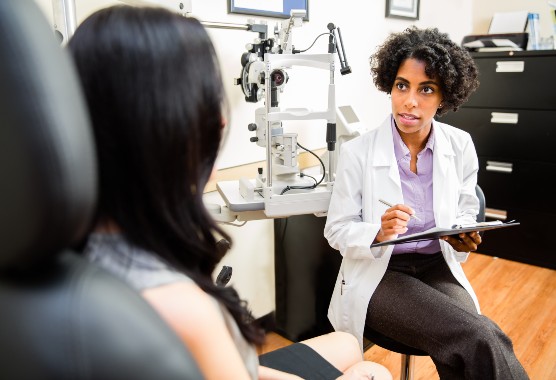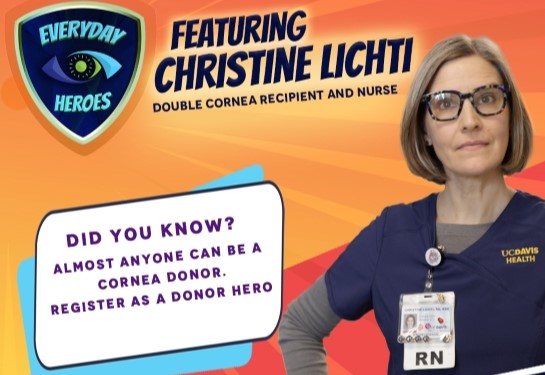Neuro-Ophthalmology
UC Davis Health offers specialized care for a wide range of neurological conditions that impact your vision.
Medically reviewed by Yin Allison Liu, M.D. on Jan. 25, 2024.

Specialists in Neuro-Ophthalmology
Neuro-ophthalmology focuses on treating vision problems caused by conditions in your nervous system. Your nervous system includes your brain, nerves and spinal cord. Neuro-ophthalmologists have specialized training in both ophthalmology and neurology.
The UC Davis Health neuro-ophthalmology team of specialists includes neuro-ophthalmic care providers and supporting medical professionals. Together, they diagnose and treat complex conditions that affect how your brain, eyes and optic nerve function.
People from all over the world travel to get care from our renowned service. We offer the most advanced diagnostics and treatment options available.
Symptoms of Neuro-Ophthalmic Disorders
Neuro-ophthalmic conditions can cause a wide range of visual symptoms.
Common Symptoms
Common symptoms include:
- Central and/or peripheral vision loss
- Color vision decline
- Double vision and droopy eyelids
- Difficulty moving your eyes
- Depth perception problems
Emergency Symptoms
Seek medical help right away if you experience any of the following symptoms:
- Changes in pupil size
- Severe headache
- Sudden vision loss
Causes of Neuro-Ophthalmic Disorders
Many types of nervous system conditions can have vision-related symptoms. These conditions may include:
Brain Tumor
A brain tumor can cause visual complications, including vision loss, double vision, and peripheral (side) vision loss.
Giant Cell Arteritis
Giant cell arteritis causes inflammation in your arteries. When the arteries that carry blood to your eyes become inflamed, you may experience vision loss.
Idiopathic Intracranial Hypertension (IIH)
Idiopathic intracranial hypertension refers to a buildup of cerebrospinal fluid in your skull. Vision changes can occur when the fluid presses against your optic nerve.
Multiple Sclerosis (MS)
Multiple sclerosis is a neurological condition that impacts your central nervous system and optic nerves. As it progresses, it can cause vision changes or loss.
Myasthenia Gravis
Myasthenia gravis is an autoimmune disease that causes weakness in your body’s muscles. This includes the muscles that control your eye movement.
Neurodegenerative diseases such as Alzheimer Disease and Parkinson Disease
Neurodegenerative disease can be associated with difficulty reading, decreased visual acuity, color perception, depth perception, and unexplained visual field defects.
Neuro-Ophthalmology Diagnosis and Testing
The Neuro-Ophthalmology Service at UC Davis Health uses the most sophisticated diagnostic tools and technology available. Your provider will discuss your medical history and symptoms and perform a complete eye exam.
Your provider may also recommend one or more of the following tests:
- Fundus photography: Takes pictures of the back of your eye with a specialized microscope and camera.
- Optical coherence tomography: Takes pictures of your retina using light waves.
- Optical coherence tomography angiography: Takes images of the blood vessels inside and underneath your retina.
- Visual field test: Examines your ability to see out of the corners of your eyes and checks for blind spots.
- B-scan ultrasound: Uses sound waves to create images of the back of your eye.
- Virtual reality testing: Uses state-of-the-art technology to check for visual function.
Neuro-Ophthalmology Treatments at UC Davis Health
Our highly trained neuro-ophthalmologists will create an individualized treatment plan for your diagnosis and symptoms. Your treatment options may include:
Corrective Lenses
Your provider may recommend prism lenses if misalignment of your eyes is impairing your vision.
Preventing Neuro-Ophthalmic Disorders
Healthy lifestyle habits can help lower your risk of some causes of neuro-ophthalmic disorders. These include:
- Drinking alcohol in moderation
- Managing and monitoring conditions like preeclampsia and eclampsia during pregnancy
- Stopping smoking and drug use
MS and optic nerve inflammation
25%Of optic neuritis cases (optic nerve inflammation) are linked to MS
Request an Appointment
As Sacramento's No. 1 hospital, you'll benefit from unique advantages in primary care and specialty care. This includes prevention, diagnosis and treatment options from experts in 150 specialties.
Referring Physicians
To refer a patient, submit an electronic referral form or call.
800-4-UCDAVIS
Patients
Call to make an appointment.
Consumer Resource Center
800-2-UCDAVIS

Ranked among the nation’s best hospitals
A U.S. News & World Report best hospital in cardiology, heart & vascular surgery, diabetes & endocrinology, ENT, geriatrics, neurology & neurosurgery, and pulmonology & lung surgery.

Ranked among the nation’s best children’s hospitals
U.S. News & World Report ranked UC Davis Children’s Hospital among the best in pediatric nephrology, orthopedics*, and pulmonology & lung surgery. (*Together with Shriners Children’s Northern California)

Ranked Sacramento’s #1 hospital
Ranked Sacramento’s #1 hospital by U.S. News, and high-performing in aortic valve surgery, back surgery (spinal fusion), COPD, colon cancer surgery, diabetes, gynecological cancer surgery, heart arrhythmia, heart failure, kidney failure, leukemia, lymphoma & myeloma, lung cancer surgery, pacemaker implantation, pneumonia, prostate cancer surgery, stroke, TAVR, cancer, orthopedics, gastroenterology & GI surgery, and urology.

The nation’s highest nursing honor
UC Davis Medical Center has received Magnet® recognition, the nation’s highest honor for nursing excellence.

World-class cancer care
One of ~59 U.S. cancer centers designated “comprehensive” by the National Cancer Institute.

A leader in health care equality
For the 13th consecutive year, UC Davis Medical Center has been recognized as an LGBTQ+ Healthcare Equality Leader by the educational arm of America’s largest civil rights organization.

